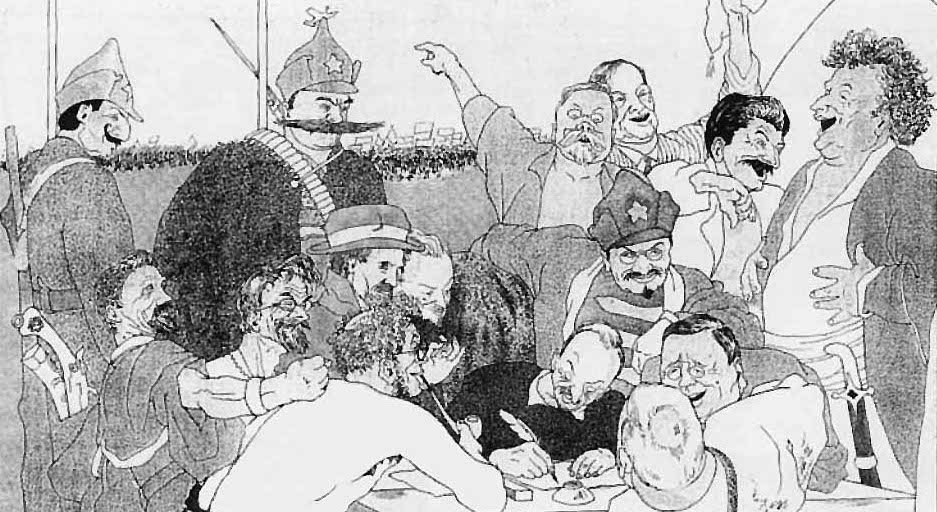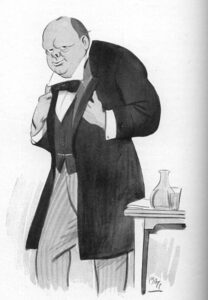
Churchill and the Red Scare: The Zinoviev Letter
Excerpted from “The Zinoviev Letter and 1924 ‘Red Scare,’” written for the Hillsdale College Churchill Project. For the original article with views of historians Paul Addison and David Stafford, endnotes and different images, click here. To subscribe to weekly articles from Hillsdale-Churchill, click here, scroll to bottom, and enter your email in the box “Stay in touch with us.” We never spam you and your identity remains a riddle wrapped in a mystery inside an enigma.
Zinoviev clamor
Sensationalized by the Daily Mail, the Zinoviev Letter appeared just before the 1924 British general election. Purportedly issued by Comintern head Grigory Zinoviev, it urged the Communist Party of Great Britain to engage in seditious activities. Electing a Ramsay MacDonald Labour government, it claimed, would awaken the working classes and lead to a Marxist revolution with the CPGB in the vanguard.
Eventually the Letter proved a forgery. It did, however, enable conservative politicians, including Churchill (running as an independent “Constitutionalist”) to raise the specter of Red revolution.
It had little effect on the election: The Conservatives under Stanley Baldwin swamped their Labour and Liberal opposition. Baldwin made Churchill Chancellor of the Exchequer and he returned to the Tories. (Zinoviev ultimately suffered execution by his own side, after a Moscow show trial in 1936.)
“The effect of the Zinoviev letter on the 1924 election result is problematical,” wrote Robert Rhodes James, “but it is of interest to see what Churchill’s reactions were.”

Was Churchill involved?
A prominent historian asks if Churchill was implicated the Zinoviev plot:
It is not indexed in Martin Gilbert’s biography…. Given Churchill’s fervent anti-communism, he seems an obvious target for conspiracy theorists. Neither Baldwin, the party stalwart J.C.C. Davidson nor MI5’s Joseph Ball knew of the plot. William Ormsby-Gore knew about it, possibly slightly later. It is hard to imagine that Churchill did not know, but it seems he was not a participant. Is that how you see it? [Yes.]
He was not…
Remarkably, the conspiracy theorists have not got round to accusing Churchill of actually writing the Zinoviev Letter–at least as far we know! It is certain that he was not involved in the forgery, though he initially accepted it as genuine. (He so wrote Foreign Secretary Austen Chamberlain a month after its appearance. See below.)
Churchill did take political advantage of the Zinoviev uproar. Even if it were forged, he said, it was nothing new where Bolsheviks were concerned. (He called Ramsay MacDonald a “futile Kerensky.”)
The following references are from our digital archive of 80 million words by and about Sir Winston Churchill. Martin Gilbert did not entirely ignore Zinoviev, publishing WSC’s 14 November 1924 letter to Chamberlain. That was written after Churchill’s “Red Plot” article had appeared in the Weekly Dispatch. At the time, WSC seemed to believe the Tories might label it authentic. But on the whole he was non-committal.
“Futile Kerensky,” 25 October 1924
Speaking a few days before polling day, Churchill highlighted what he saw as a very real danger of Soviet agents in Britain, and MacDonald’s unconcern. (Alexander Kerensky was the Menshevik head of the short-lived 1917 Russian provisional government, ousted by Lenin in the October revolution.)
[Extract] Even if the Moscow letter is a forgery it in no way alters the facts that Bolshevik propaganda has never ceased during the last four years. They have never ceased to stir up bloody revolution in India and to foster strife in this country. The Prime Minister [MacDonald] said he believes this letter is authentic, but the Communist forces are already on his track, and the moment is coming when this futile Kerensky will make another surrender.
The process of conversion has already begun. Mr. MacDonald said he was going to probe the matter to the bottom, and he described the affair as a new Guy Fawkes Gunpowder Plot.
The Prime Minister is preparing already to turn about, and I venture to predict that before the election is over, we will find Mr. MacDonald singing in chorus with the rest of his Ministers that the letter he has said he honestly believes is authentic is a gross forgery and a dodge of the Conservative Party.
“The Red Letter,” 2 November 1924
Writing three days after the election, Churchill insisted that the Zinoviev Letter represented genuine Soviet intentions. He lampooned the now-defeated MacDonald’s efforts to loan Russia money and expand trade:
[Excerpt] Let us consider this “Red Letter” itself. It contained nothing new. From the earliest moment of its birth the Russian Bolshevist Government has declared its intention of using all the power of the Russian Empire to promote a world revolution. Their agents have penetrated into every country. Everywhere they have endeavoured to bring into being the “germ cells” from which the cancer of Communism should grow….
When, on October 16, the “Red Letter” first received the attention of the Prime Minister, only two courses were possible for any reasonable man. The first was to treat it as a document of no more consequence than many others in the Foreign Office archives or to refuse to accept its authenticity and to continue his advocacy of the loan to Russia. The second was to publish it…and declare that after such an affront, the whole policy of the Russian Treaties must be abandoned.
Mr. MacDonald did neither. He accepted the authenticity of the document; he affirmed its extraordinary importance; he denounced it in sweeping terms, and he continued to appeal to the amazed electors for a guaranteed loan to Russia.
* * *
Was the letter a forgery [or] the Foreign Office hoaxed? Was its chief misled by his officials? Such were the furious questions which the discomfited Socialist Ministers immediately hurled at their leader…. We do not know what evidence they had at their disposal [but] it was weighty and cogent. We know that these attempts to foment disorder and revolt in Britain and the British Dominions have been unceasing.
Such a document is only typical. It might have been sent out as a matter of mere routine from the Bolshevist headquarters….. The “Red Letter” did not illuminate the controversy. Its publication, with Mr. MacDonald’s confirmation and protest, only stultified him and the Socialist Party. But that stultification came as the final stroke in a long process of conviction which at length roused the British nation to an expression of national censure more effective than any which our modern political history records.
Churchill to Austen Chamberlain, 14 November 1924
[Excerpt] We shall in all probability have to proclaim in a few days’ time that we believe the Zinoviev Letter to be authentic, and that is only part and parcel of the general policy of propaganda unceasingly pursued by the Soviets. If we say this, it follows that we believe the Bolsheviks have broken their solemn engagements under which they were admitted to this country both in the days of the Krassin mission and in those of Rakovsky.
If they have thus broken their engagements, and have attempted to stir up rebellion in our midst, what grounds are there that can justify our proceeding to allow them to remain here? The representatives of no other country would be permitted to remain if convicted, in our opinion, or similar offences. I am certain that no mere Note or answer will by itself be sufficient to satisfy either justice or public opinion. It is essential that action should follow a declaration of the authenticity of the Zinoviev letter. The question is what action.
Zinoviev in the War Memoirs
In 1947, Churchill asked the philosopher and historian Isaiah Berlin to read a draft of The Gathering Storm, his first volume of Second World War memoirs. Berlin replied with a mention of the Zinoviev Letter. The Gathering Storm, Berlin wrote
seems to me to take some time to get going properly. The main theme is the Rise of Hitler, and the blindness of England and the Western World. If the story is to start with the earlier “peaceful years” 1924-1929, it may be felt to lack something unless the central events which linger in the popular memory—the General Strike, relations with Russia (the Zinoviev Letter, the Arcos Raid), etc. are placed in proper focus; alternatively all this could be condensed into a general prelude to the real story—with not too rigid a skeleton of chronology—a kind of commentary on the moods and acts of these remote deluded years, not overweighted with specific detail, a background to the awful things to come.
Berlin suggested jettisoning the rather bland Chapters II and III (“Peace at Its Zenith” and “Lurking Dangers”) and going right to Chapter IV (“Adolf Hitler”). Churchill did shorten those chapters. But if WSC’s early drafts mentioned the Zinoviev Letter, it did not appear in the book.
The only reference to Zinoviev in The Gathering Storm was in passing, though abrupt. Describing Stalin’s 1937 purges, Churchill wrote: “Zinoviev, Bukharin, and others of the original leaders of the Revolution, Marshal Tukhachevsky, who had been invited to represent the Soviet Union at the Coronation of King George VI, and many other high officers of the Army, were shot.”
Further reading
“Churchill, Henry Ford and Sidney Reilly: Anti-Bolshevik Collaborators?” 2022.
“Churchill’s Magnanimity: Stanley Baldwin 1867-1947,” 2021.
“Zionism, Bolshevism, Enemies of Civilisation: What Churchill Said,” 2021.
“‘Stalin Never Broke His Word to Me’: Were These Churchill’s Words?” 2020.
“Churchill and the White Russians: The Russian Civil War, 1919,” 2019.






